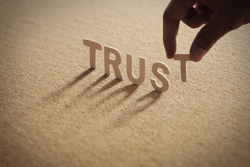 In today’s fast-changing world, people are finding it harder than ever to trust institutions and leaders. Instead, they are looking to business to speak out on important issues.
In today’s fast-changing world, people are finding it harder than ever to trust institutions and leaders. Instead, they are looking to business to speak out on important issues.
The Edelman Trust Barometer 2021 reveals that trust in government, the media, and non-governmental organizations is falling around the world, while faith in business is holding up.
What is behind this trend, and what can organizations do to demonstrate that they are worthy of trust?
We are trusting less
The Edelman Trust Barometer 2021 surveyed over 33,000 respondents in 28 countries around the world.
The results of the survey signalled a falling level of trust in government and institutions. Trust in non-government organizations (NGOs), business, government and the media rose 6% between January 2020 and May 2020, reaching a positive 61% on average.
By January 2021, this level fell from 61% to a neutral 56%. Trust in government declined eight points, media six points, NGOs six points, and business trust fell three points.
Business is now more trusted than the government in 18 of the 27 countries polled; 61% of people trust business compared to 53% trusting government. This means that business now plays a stronger role in providing stability than the state and social institutions.
Two of the world’s largest economies, China and the US, saw significant reductions in trust in their governments.
Trust in the UK government fell 15%, meaning only 24% of respondents expressed trust in the government, the second lowest level after South Korea. Trust in UK-headquartered companies also fell, dropping 5% to 56%, the lowest rate in eight years of tracking.
Why is trust falling?
Many factors determine the way that institutions are perceived. In the era of so-called ‘fake news’, people are less trusting of news outlets and more likely to seek out news that confirms their own beliefs. Social media and so-called ‘echo chambers’ exacerbate the issue.
A 2020 Reuters survey found that only 42% of people trust the news globally and most people (55%) are concerned about disinformation. Almost one third (32%) of people now actively avoid the news. The UK has seen one of the highest jumps in news avoidance, up 11%.
The so-called ‘culture wars’ are increasingly skewing people’s perceptions of world events, producing higher levels of suspicion of people with different political views. For example, in the US, only 36% of Republicans report worrying about global warming ‘a great deal’ or a ‘fair amount’, compared to 90% of Democrat voters.
The cultural divide also influences attitudes towards social issues, including race, inequality and immigration. The COVID-19 pandemic has been a rollercoaster ride for public trust, with the government handling of lockdown, vaccine rollout and recovery resulting in rapid changes in how leadership is viewed.
The consequences of reduced trust
Why does it matter if we do not trust our governments and institutions? The short answer is that trust is the glue that bonds society together. Strong institutions help to ensure respect for the rule of law, property rights, reduce the perceived risk of economic interactions and investments. They generally provide a stable operating environment in which people know what to expect from institutions and therefore have greater confidence.
Reduced trust translates into greater social and economic volatility. From a consumer perspective, trust means not having to carry out extensive research and checking before buying a product or service. Only 34% of consumers say they trust the brands they use, although 81% say trust is a deciding factor in purchasing decisions.
Businesses are being called on to fill the void left by ebbing trust in governments and other institutions. The Edelman Barometer found that 86% of people expect CEOs to speak out on important social issues, and 68% said CEOs should step in where governments fail to act on societal problems. A small majority (53%) said when news media is absent, corporations should fill an information gap.
How can standards help with trust?
Consumers look for quality, value for money and transparency when deciding whether to trust a brand or company. In a world where disinformation makes it more difficult to discover concrete facts, using a standard can demonstrate an objective characteristic of a product, service or process. Standards apply equally to all organizations and are an easily identifiable way to demonstrate trustworthiness.
Mark of Trust and Kitemark
The BSI Mark of Trust is one important way of building trust, and a valuable marketing tool.
It helps organizations show they have successfully met the requirements of a standard. It also helps consumers, customers, specifiers and the wider market recognize and trust organizations who are certified by BSI.
The Mark of Trust symbol can be displayed on websites, vehicles, business cards and promotional materials.
When it comes to products, BSI Kitemark certification, only available from BSI, is the ultimate mark of trust. It helps organizations to differentiate products, access markets and demonstrate their commitment to quality.
BSI research indicates that people associate the BSI Kitemark with quality, reliability and safety. Almost all survey respondents (95%) said they would be more likely to buy a product that displayed the Kitemark, and 87% said they would be willing to pay more as well.
In a world of declining trust in so many aspects of life, the BSI Mark of Trust and BSI Kitemark could help your business to demonstrate that it is truly worthy of trust. Find out which schemes apply to your industry, learn about new schemes and check for updates on the BSI website.

 In today’s fast-changing world, people are finding it harder than ever to trust institutions and leaders. Instead, they are looking to business to speak out on important issues.
In today’s fast-changing world, people are finding it harder than ever to trust institutions and leaders. Instead, they are looking to business to speak out on important issues.